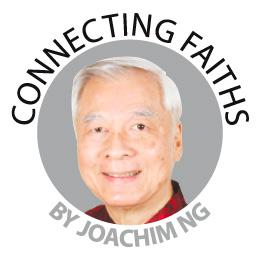WHAT is an act of God? The term was used in Parliament last month when Ministers of Parliament (MP) debated the cause of massive flooding in a Kedah district in August that killed four people. A federal minister said the devastation was an act of God as he had personally seen trees with their roots intact being carried away by the water. An opposition leader cast doubt on his claim.
Insurers know what “act of God” means. When you buy general insurance cover that excludes flood and your property gets washed away, your insurer may pin the action on God to avoid paying compensation.
Belief in acts of God can lead to a dependency mindset that evades responsibility. Millions around the world refuse to be vaccinated against Covid-19 because they want to see evidence that God has acted.
Over the years, devotees of nearly all religions have prayed for rains to stop when there is heavy flooding. And in a prolonged dry spell, they pray for rain. In some months, they pray for rain to stop and in other months they pray for rain to pour. Such prayers are wrongly directed.
Extreme weather conditions are now the acts of humanity, and the evidence is in the latest climate data. This year has seen extensive wild fires burning some regions of the world, and monstrous floods drowning other regions.
The reason these prayers do not work is that God is not the force behind climate change. God is not part of the climate change cause-effect link. Humanity is the causative force. You have to fix human beings.
The belief in acts of God has its origin in early civilisation when food supply for urban settlements became highly dependent on the weather. Without rain or with floods, crops and livestock would die; societies would perish.
Institutional religions came to the rescue with a teaching that just as God acts to bring down a storm, God can also dispel a storm. Should a hot dry spell induce fires and famine, divine intervention can save the trees and water the fields.
As an inducement for God to act, you have to offer the best of your harvest if you are a farmer or the best of your livestock if you are a herder. This early practice of gift offering is immortalised in the story of Cain and Abel that we find in the Torah, a West Asian scripture.
Elder brother Cain stands for the farming community, and the younger Abel stands for the herders, whose emergence was to overshadow the planters. They both made their sacrifice. But intense rivalry developed that led to murderous violence.
In Africa today, we still find enmity between farmers and herders as they compete for scarce land and water resources. To heal the economic rivalry and dampen the competition for primacy that threatened to destroy early civilisations, a unifying type of sacrifice was invented.
From the Atlantic to the Pacific shores, young men and women were ritually slaughtered as the best of all gifts. The British and French people, facing a Roman invasion, built sacrificial altars that the Roman legions would destroy after seeing neat rows of human skulls placed on them.
On the other side of the Atlantic, the Amerindian civilisations developed a liking for child sacrifice as a means to dampen killer storms brought on by the El Nino weather phenomenon.
Move across the Pacific to China, and archaeologists have discovered evidence of human sacrifice during the Shang Dynasty more than 3,000 years ago. In Sabah, the Kaamatan Festival commemorates the offering of a legendary young woman called Hominodun, who became a willing sacrifice so that there would be food for the people during a time of famine.
All regions of the world practised human sacrifice as a unifying ritual for societies. But the morality of such blood-letting was increasingly being questioned. We get an early hint of child sacrifice in West Asia in the Torah story of Abraham, who built an altar in a rather matter-of-fact way to willingly sacrifice his son, but ended up killing a nearby ram instead. The subtle message is well expressed in the literary dramatic style
of that era.
But as religions became more sophisticated, human sacrifice took on a higher meaning. Hinduism was the earliest religion to transmute the ritual into the loftiest form of sacrifice – the sacrifice of ego. Known as purusayajna in Sanskrit, or the sacrifice of man, Hindu texts extol the need for ego to die so that the higher self can live.
As the word purusa denotes collective humanity, the call is to sacrifice partiality for the sake of a whole identity. The World Family tag mooted by Prime Minister Datuk Seri Ismail Sabri Yaakob can serve as a great booster, if Malaysians take up the idea of complete inclusivity. Turn it into a planetary vision with humans, wildlife and forests co-existing as one family.
Climate change has ushered humanity into a new era of monstrous fires and calamitous floods. There will be more of everything bad – from killer viruses to killer heat waves and killer storms. The sooner we sacrifice the ego, rather than sacrifice the animals or trees, the faster we can beat back the tide of climate change.
In the Rig Veda scripture of Hinduism is this beautiful prayer: “He who sees all beings at a glance, both separate and united, may he be our protector.”
May we be able to see all beings as separate and yet united as one. When you see television images of wildfires sparked by heatwaves consuming the forests in country after country, may these words in the Sri Guru Granth Sahib, the scripture of Sikhism, come to mind: “The ego has burnt down the whole world.” Through ego we have placed humanity’s desires above the World Family.
The writer champions interfaith harmony. Comments: letters@thesundaily.com










